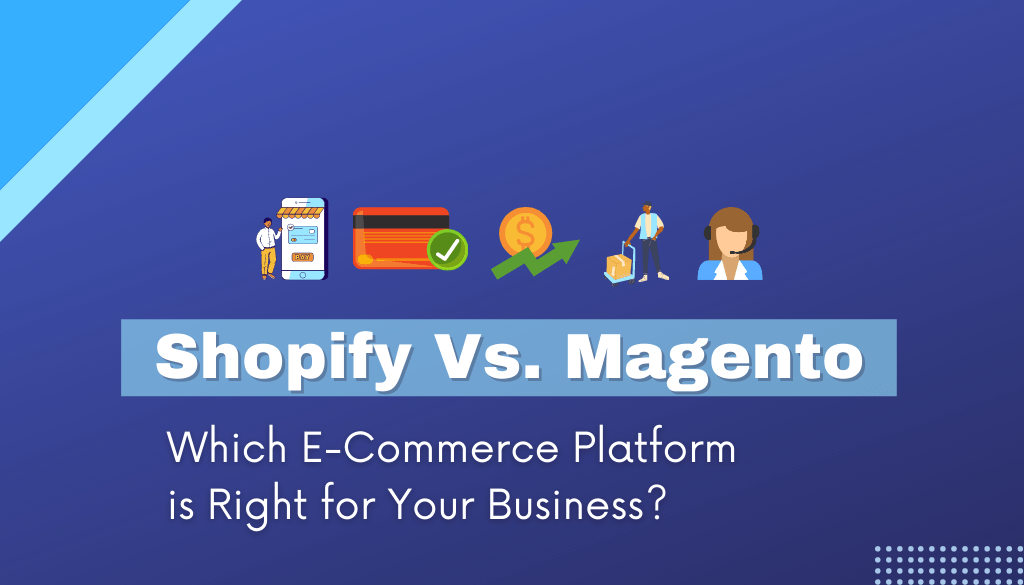Shopify Vs. Magento, Which E-Commerce Platform is Right for Your Business?

Today, numerous ambitious business owners are looking to scale their offline ventures by adding a brand new digital channel to their operations i.e., starting their own e-commerce website to market their products, ideas, or services online. But, building an e-commerce website is a major hurdle for these aspiring entrepreneurs. Some of them lack the knowledge and expertise to develop their own websites, whereas some fall short of the budget to hire a developer for the creation and maintenance of the website. In the era where we have multiple online tools available to solve our slightest of inconveniences, do we have a few to solve this one?
Since the dawn of the e-commerce era, there have been numerous website development and hosting service providers for entrepreneurs to build their business websites, such as GoDaddy, WordPress, Wix, etc. To capture a niche market Shopify was launched in 2006, with a shopping cart software and is now catering to these young entrepreneurs who aspire to sell their goods, ideas, and services through web channels. Magento is another E-Commerce web development website that is into a similar line of business, which was founded in 2008 and was acquired by Adobe in 2018. Both of these provide frontend and backend designing and management services to its customers along with which they provide web hosting services.
Shopify, headquartered in Ottawa, has proven to be famous among the small businesses and new start-ups who are looking for user-friendly shopping cart software. At present Shopify is catering to merchants in 175 countries around the world. Shopify is for those who are new to e-commerce and searching for user-friendly IT software. The Canadian company has 4 packages to offer to its customers starting at $ 29/mo ($9/mo for Shopify lite) it charges certain transaction fees to its customers based on the value of the package subscribed. In return, Shopify provides services like hosting, transaction management dashboard, unlimited product listing, multi-channel selling (Social Media), SEO services, abandoned cart recovery (remarketing), and 10 themes for the website. Checkout is not customizable at the discretion of the merchants, SEO and content marketing options are not up to the mark whereas the plugins and apps are quite expensive.
On the other hand, the Adobe owned software is more complex than Shopify and is preferred by medium and large-scale businesses as it requires certain coding knowledge, to begin with. Magento is an open-source software that is free of cost but to make your website efficient you require several plug-ins to add features to your website. Magento provides quite efficient customer support associated with SiteGround and also advance SEO techniques to improve your page ranking. Magento is significant when it comes to customization and for levelling up the website’s features based on the evolution of business. There is a huge range of themes starting from $600 up to $25000 – that’s apparently dear.
Factors to consider before you make up your mind:
While you compare these SaaS platforms there are certain criteria that you must pay regard to:
⦁ Understand the nature (Product, Idea or Service) and size of your business
⦁ Project your budget for building a website, know if it’s feasible
⦁ SEO support or consulting
⦁ Marketing and sales features requirement
⦁ Connecting with your customers after-sales
⦁ Inventory size and its management
⦁ Room for expansion of your business in future
⦁ The efficiency of the platform’s customer support
⦁ Mobile-friendliness of website
⦁ Hosting and loading speed of the website

In addition to these factors, there are certain problems faced by the merchants while operating the websites on both platforms, and you can read about problems associated with both Shopify and Magento.
A leading Ed Tech company, was planning to transition all its daily operations online with integrated solutions to support its business because of the ongoing pandemic. Sankey Solutions provided bespoke software development services along with integration with the latest ecommerce platform to decode the problem and create a resilient backend and frontend LMS.
Conclusion:
These are two e-commerce development platforms with two different marketing strategies. Both the platforms being similar are quite different at the same time. As per our comparison of both the platforms, we could infer the following:
Adobe’s subsidiary, Magento, is catering to medium and large-scale businesses which have developed their presence in their respective markets and are willing to expand. Businesses which need to customize their website as per their standard processes and structured flow or have a sense of feeling that your business might scale at faster pace shortly, then Magento is more appropriate for you. Also, for those who have their sales on track and prepared to pay out CAPEX on their website development.
On the other hand, Shopify is a user-friendly website that offers to handle the hosting hassle for its users. The platform is for small businesses or for beginners who want to commence their E-Commerce operations through the website. If your business is hyper-local and has limitations to its expansion, you may choose Shopify to be the right fit for website development. For this, Shopify charges a transaction fee based on the package, which is OPEX for the business as it will vary based on the volume of your sales.
About Sankey Solutions:
Sankey Solutions is a next-generation Technology Services and IT consulting firm offering advanced software, data engineering, and analytical solutions. With a unique talent model and matured learning ecosystem, Sankey Solutions is designed to unlearn, learn and implement new technologies at the fastest pace giving businesses a true competitive advantage. Sankey Solutions works with leading corporates and start-ups across Europe and Asia with offices in UK, Singapore, and India.
Our e-commerce specialists have created numerous strategic digital shopping solutions for businesses of all sizes and shapes along with executing complex integration project across e-commerce platforms. Get in touch and get started on your e-commerce jouney.